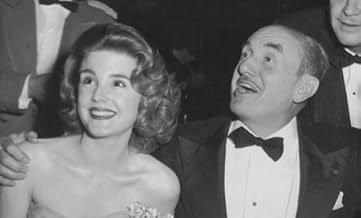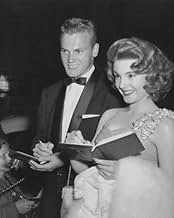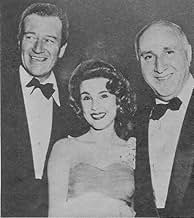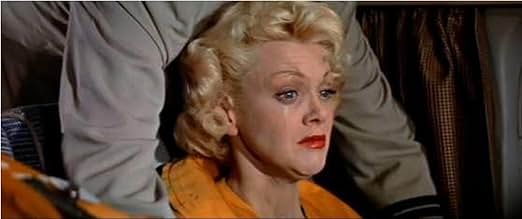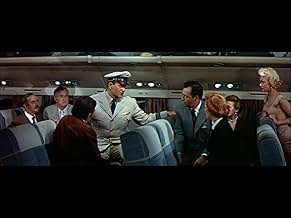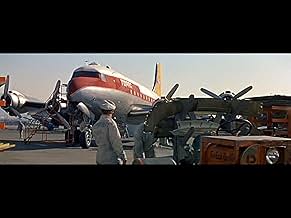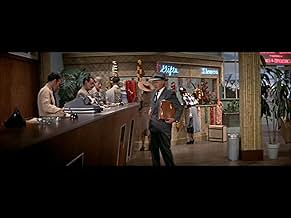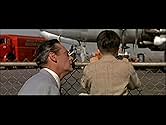Ein Verkehrsflugzeug auf einem Trans-Pazifik-Flug bekommt Triebwerksprobleme und der Pilot verliert die Nerven. Nun liegt es an dem abgewrackten Co-Piloten Dan Roman, das Flugzeug sicher ins... Alles lesenEin Verkehrsflugzeug auf einem Trans-Pazifik-Flug bekommt Triebwerksprobleme und der Pilot verliert die Nerven. Nun liegt es an dem abgewrackten Co-Piloten Dan Roman, das Flugzeug sicher ins Ziel zu bringen.Ein Verkehrsflugzeug auf einem Trans-Pazifik-Flug bekommt Triebwerksprobleme und der Pilot verliert die Nerven. Nun liegt es an dem abgewrackten Co-Piloten Dan Roman, das Flugzeug sicher ins Ziel zu bringen.
- 1 Oscar gewonnen
- 5 Gewinne & 6 Nominierungen insgesamt
- Gonzales
- (as Gonzalez Gonzalez)
Handlung
WUSSTEST DU SCHON:
- WissenswertesErnest Gann's novel clearly indicates that the character of Sally McKee has resorted to prostitution in order to survive. The film version, made at the height of Hollywood censorship, was unable to explicitly state this; however, Gann slyly managed to insinuate the information during Sally's entrance, wherein two sailors at the Honolulu airport recognize her and pointedly remark, "Hey, look! Remember?"
- PatzerNear the end of the film, Air Traffic Control clears the aircraft to land on "runway 39" This is impossible. Runways are numbered are within 10 degrees of their actual magnetic heading, and since there are only 360 degrees on the compass, the highest runway number possible is "runway 36".
- Zitate
Alsop: She may be put together with paste and flour, but that woman has something. What would you say it was?
Miss Spalding: Practice. Plenty of practice.
- Alternative VersionenThe song "The High and the Mighty" (with lyrics) does not appear in the original 1954 release of this film. However, the studio wanted the hugely popular, chart-topping song to be nominated for the Best Song Academy Award that year. According to AMPAS regulations, the song could not be nominated because it was no officially sung in the film, even if would be heard elsewhere. To satisfy these regulations, a version was released towards the tail-end of 1954 for a few nights only with the song inserted into an Exit Music. The Academy then decided to give the song a nomination on the basis of these screenings. The song lost to "Three Coins in a Fountain".
- VerbindungenEdited into Geheimagent des FBI (1959)
As some have speculated, there's no way for this film to live up to the hype that has grown up because of its near-forty year unavailability. It's been beautifully restored. The picture quality seems to my uneducated eye to be impeccable, and the sound is really magnificent. And there are some moments of nice performance, particularly by Wayne, Robert Stack, Jan Sterling, and John Qualen. But as much as I would love to say this is a resurrected masterpiece, it simply isn't possible for me to do so honestly. After AIRPLANE!, I'm not sure it's reasonable to expect people to take a Fifties airliner disaster movie seriously. But the level of corn and hokum and treacle and syrup in which the film wallows (especially in the primary sections dealing with the passengers rather than the crew) is simply intolerable in today's world. I'm not referring to the fact that it's a different practical world now, one in which it would be ludicrous to show a passenger pulling a gun on another passenger on an airliner of today. I'm referring rather to the simple unbelievability of the human behavior exhibited. I'm willing to accept a passenger getting aboard a trans-Pacific airliner with a gun in his pocket in 1954. I'm not willing to accept him pulling that gun, threatening other passengers with it, having it taken from him, and later having it handed back to him just because he says, "I'm all right now, I've calmed down." Phil Harris, fifty at the time and looking sixty, plays a 38-year-old, and 43-year-old Ann Doran plays his 30-year-old wife. Laraine Day berates her husband and demands a divorce, and good ol' Phil says to the husband, "You think you got problems?" and proceeds to tell him about how rain and crummy hotels ruined his vacation, and the husband (John Howard) thus sees his own life in a new perspective. Every cliché imaginable comes into play, and rarely is there a moment that can be easily swallowed, even with Herculean efforts to place oneself mentally in the zeitgeist of the film.
Only in the cockpit are things comparatively realistic and believable, and even there big pills must be swallowed. One of the reasons John Wayne comes off so well in this film is he has relatively little to say. It's probably the lowest line-count of any of Wayne's leading roles, and thus unsaddled with the maudlinities and sappiness of the dialog the passengers are stuck with, he comes off better than anyone in the picture. Spencer Tracy was supposed to play Wayne's role but turned it down (according to various stories) either because he thought the script was lousy or he didn't want to work for taskmaster William Wellman. I'm betting on the former reason.
There are still things to like in THE HIGH AND THE MIGHTY (Dimitri Tiomkin's Oscar-winning score among them), but an awful lot of people have been waiting forty years to see this "masterwork" again, and an awful lot of them are going to be either seriously disappointed or forced to convince themselves that it's not as bad as it seems.
Top-Auswahl
- How long is The High and the Mighty?Powered by Alexa
Details
Box Office
- Budget
- 1.470.000 $ (geschätzt)
- Weltweiter Bruttoertrag
- 4.334 $
- Laufzeit2 Stunden 27 Minuten
- Sound-Mix
- Seitenverhältnis
- 2.55 : 1
Zu dieser Seite beitragen



